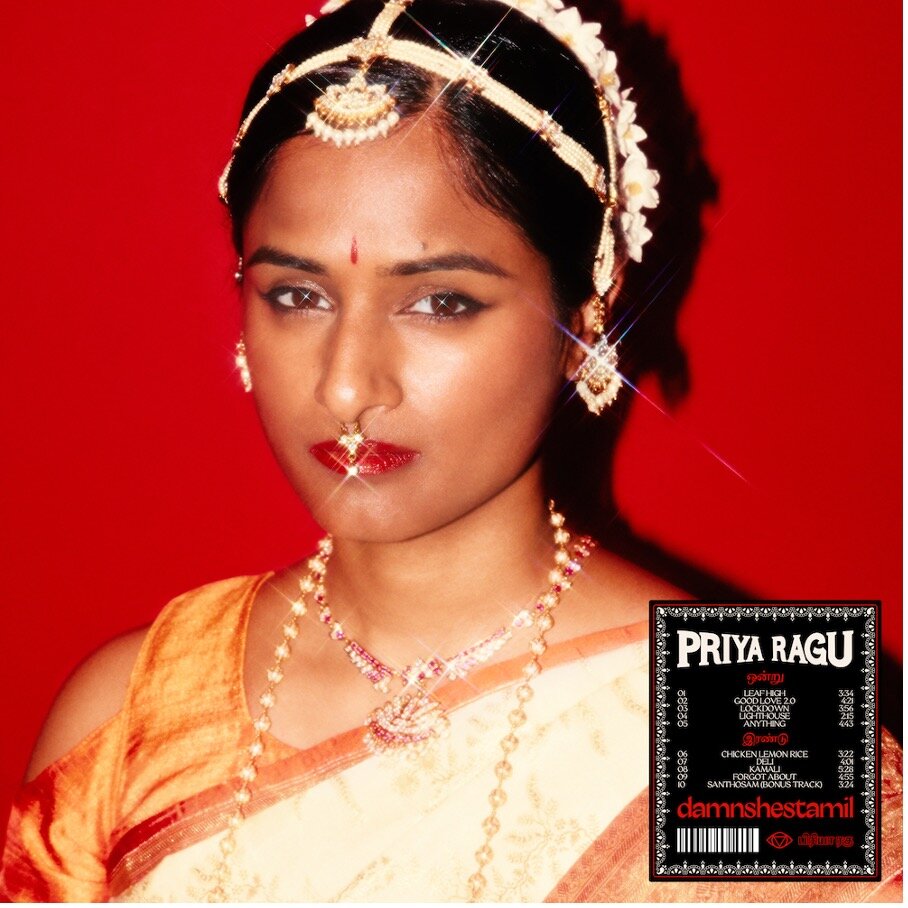Pop-R&B artist Priya Ragu taps into her Tamil roots with debut “damnshestamil” mixtape
Image by torvioll jashari.
Written by Shruti Mishra, edited by Dalia Al-Dujaili.
Following the hype of her debut single, “Good Love 2.0,” Priya Ragu premiered her mixtape “damnshestamil” early last month. The 11-track, 35-minute project is a melange of Priya’s heritage, a foot in both the East and West, as her buttery vocals lay over a fusion of rhythms and melodies.
“damnshestamil” alchemizes jazz, soul, and RnB with South Asian instrumentation and Tamilian-film industry Kollywood music samples. The result is a fluid sound, untethered to any single genre – a sound Priya Ragu refers to as “Raguwavy.”
“Raguwavy” is as global as the singer herself. The “damnshestamil” vocalist and her family fled Sri Lanka in the 1980s during the civil war to Switzerland. From Switzerland, Priya bounced around the United Kingdom and the United States, even briefly pursuing music in New York City. Despite traversing multiple countries and continents, Priya’s core inspiration originates from her home-base. In fact, It was her co-writer, producer, and brother, JaphnaGold, who coined the term “Raguwavy” and originally suggested incorporating South Asian samples and singing in Tamil.
“What’s a dream if you don’t act up on it?” Priya’s song “Anything” mirrors her mindset as she daringly quit her technical job last year to venture into the pop scene at 35. To an industry plagued by sexism, she may seem like a late bloomer, but Priya’s on her own time. In an interview with Dazed Digital, she shares, “I felt like the universe was telling me, just do one song and then you will see the results.”
The outcome of Priya’s faith is a body-of-work that feels like a sonic block party. The project incorporates groovy dance tracks to soulful RnB records. Pop-anthem “Lockdown” is an optimistic attempt to cling to human connection during quarantine (“Stay for a while, keep me company for now / I don’t like to be left alone, times like these are hard to call”). “Chicken Lemon Rice” is a flavorful symphony of genres such as dancehall and pop.
After years of living in the shadow of obedience of her strict-Asian parents, Ragu discovers her perfect harmony. “Leaf High,” is a picturesque description of the euphoria of living your truth (“Never mind the rain before/ as long as the sun lights up my soul”). “Lighthouse”seamlessly weaves in the flute, meanwhile ''Deli” combines slowed-and-reverb vocals over the tabla. While the mixtape demonstrates versatility, the ballads lack emotional depth: “Forgot About” reminisces a lost connection, yet despite Priya’s soulful voice, the song falters to pull at the heartstrings.
Ultimately, Priya’s strength is her curiosity, and her rebellious nature shines through with “Kamali,” which details the life of single mother Suganthi raising her daughter, Kamali. Inspired by a short film of the same name, “Kamali'' challenges cultural values of serving a man, and encourages women to seek more (“They never wanna see us godly/ Devis and maharanis/ ‘Bout to flip the script/ 2020, it’s a plot twist”). The mixtape concludes on an experimental note with the bonus track “Santhosam.” A return to the singer’s origins, the Tamil bhajan was written by Priya’s parents and features their vocals as well.
Akin to M.I.A.’s discography and Kali Uchi’s “Sin Miedo (del Amor y Otros Demonios) ∞”, “damnshestamil” is a venture into the mainstream, yet also an homage to the singer’s Tamilian roots. Priya Ragu’s debut mixtape is a monumental unveiling of the “Raguwavy” sound and a testament of an increasingly, culturally-aware RnB. By balancing tradition and modernity, the Zurich-based artist proves that the global music industry has forgone conformity and excitingly previews what is to come.
